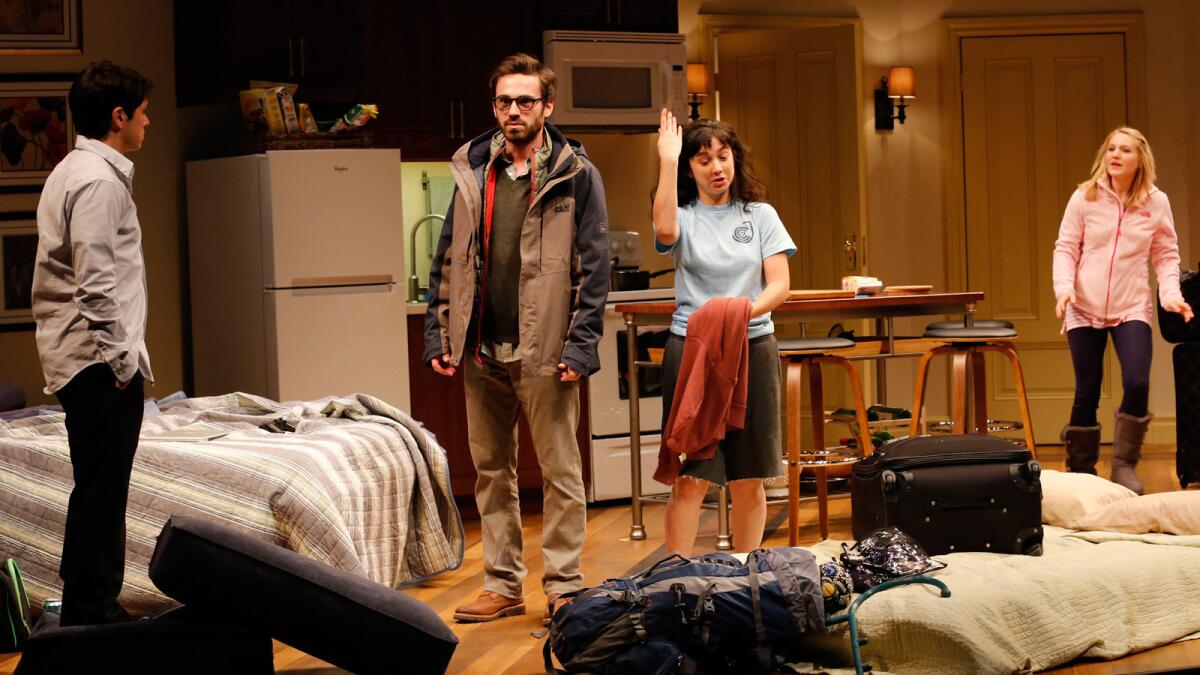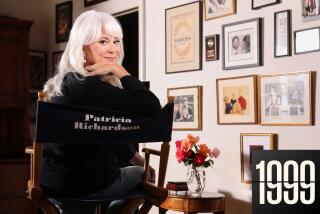Review: Chutzpah and humor temper message in the play ‘Bad Jews’

Actors Raviv Ullman, left, Ari Brand, Molly Ephraim and Lili Fuller star in the play “Bad Jews.”
Daphna (Molly Ephraim), an opinionated and quarrelsome Vassar senior, has embraced her Judaism to the extent that she plans to move to Israel after graduation, start a rabbinical program led by a female vegan rabbi and even join the Israeli army if she can get around the immigration obstacles.
It’s hard to imagine anyone competing with her diatribes, but her cousin Liam (Ari Brand), a graduate student in cultural studies with a secular worldview and a blond girlfriend, gives her a run for her boisterous money.
Lung power is an essential requirement of Joshua Harmon’s corrosive comedy “Bad Jews,” which opened Wednesday at the Geffen Playhouse under the direction of Matt Shakman. The play, a hit in New York and London and one of this season’s most produced works, employs a sitcom-y setup to bring these two opposing temperaments within screaming distance of each other.
After their grandfather, a Holocaust survivor, dies, Daphna and Liam are forced to bunk together in the New York studio apartment (convincingly conjured by scenic designer John Arnone) that Liam’s wealthy parents bought for him and his brother, Jonah (Raviv Ullman), in their building.
Daphna, never more morally outraged than when she’s jealous, can’t get over this real estate extravagance — a pied-à-terre with river views for brothers who haven’t even finished school yet.
“Um, in normal families, Jonah, if people need a place to sleep, they like sleep on the couch, or double up in beds, or even — and this will really shock you — sleep in sleeping bags,” this self-appointed queen of common sense can’t help pointing out. “They don’t buy a spare apartment on the off-chance someone might need to spend the night.”
Liam, who has brought his sweet but none-too-bright girlfriend Melody (Lili Fuller) along, doesn’t have his brother’s tolerance for Daphna. In fact, he can’t spend five minutes in the same room with her without going completely berserk. He thinks her “über-Jew” routine is all an act, insists that her name is actually Diana (“I know she wishes she were this like barbed-wire-hopping, Uzi-toting Israeli warlock superhero”) and rails at the way she brushes her frizzy hair all over the place.
Daphna considers Liam a self-hating Jew who chooses “tepid little Bambi creatures” like Melody out of a pathetic combination of “hypermasculine” arrogance and insecurity. She has a knack for seizing on weaknesses, and any information she gleans about her enemy — such as the delectable tidbit that Liam and Melody met on Match.com — is used to gain an advantage.
The plot, such as it is, involves a Chai medallion that belonged to the grandfather, which he hid in his mouth during his years in a concentration camp. Daphna thinks that she, as the grandchild most connected to Jewish heritage, should inherit it.
Liam, however, is already in possession of the heirloom, and he plans to give it to Melody when he proposes to her, just as his grandfather gave the medallion to his bride when he was too poor to afford a ring.
This conflict provides a neat way of structuring the combat between Liam and Daphna, but the richness of the play is in the flamboyant vitriol of the language and the dysfunctional gusto of the characters. The situation, which grows contrived in the final stretch, is merely a pretext for verbal war games.
Harmon, a recent graduate of Juilliard, complicates the play’s overall argument by creating such flagrantly messy and flawed characters. But in exaggerating their traits beyond even the point of stereotyping, he occasionally makes the rookie mistake of pursuing laughs over truth.
Melody is such a simpleton that the mockery she elicits not only feels cheap but it undermines any credibility in Liam’s romantic attachment to her. Daphna grows so mean-spirited that it’s a mystery why anyone would put up with her ranting. And Jonah is a little too underdeveloped to bear the weight his character is given in a surprise twist at the end.
Shakman’s production tries to amend these shortcomings by keeping the actors as grounded as possible. Even when one of them is flying through one of play’s relentless speeches — the riffs are like a cross between a vociferous David Mamet harangue and a self-dramatizing Richard Greenberg aria — the psychology behind the torrent of words is respected.
“Bad Jews” is a little too intent on keeping its audience giggling to fully realize the allegory on extremism inherent in its tale. But the humor does more than entertain — it vexes and disturbs while challenging simplistic distinctions between “good” and “bad” Jews.
More to Read
The biggest entertainment stories
Get our big stories about Hollywood, film, television, music, arts, culture and more right in your inbox as soon as they publish.
You may occasionally receive promotional content from the Los Angeles Times.











